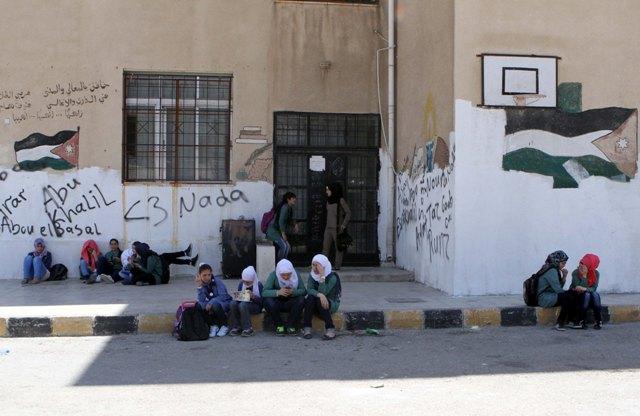You are here
Ministry might recruit teachers on temporary basis to counter strike — source
By Khaled Neimat - Aug 26,2014 - Last updated at Aug 26,2014

AMMAN — The Ministry of Education might hire 60,000 teachers on a contract basis, a temporary appointment to make up for educators who are on strike, an informed source said.
The source, who spoke on condition of anonymity, said that this solution is one of several scenarios the ministry is ready to implement if the Jordan Teachers Association (JTA) insists on continuing with the strike, which started less than two weeks ago, bringing the learning process at public schools almost to a complete halt.
The source said the number of applicants for temporary teaching jobs can offset the number of teachers who are on strike, despite claims by JTA that 85 per cent of teachers have responded to the syndicate’s call for the strike.
The government says that five of the six demands of teachers have been met, except the financial one, citing lack of funds.
The JTA demands include changes to the civil service by-laws regarding sick leaves, promotions and leaves without pay, investigating the Education Ministry’s pension fund and referring its case to the judiciary, implementing a “better medical insurance system”, increasing teachers’ salaries, awarding them more financial benefits and ensuring that they are given better contracts at private schools.
The minister is expected to announce the recruitment plan to lawmakers as he meets with members of the Education Committee at the Lower House Wednesday, the source said.
In an interview with the Jordan TV late Monday, Minister of Education Mohammad Thneibat said the strike was “unpatriotic” because teaching is a sensitive job that affects the lives of millions, just like medicine and the judiciary.
He charged that the strike and its timing were “pre-meditated”, in apparent reference to the fact that the JTA leadership is dominated by Islamists and supporters of the Muslim Brotherhood, echoing several critics who argue that politics is involved in the move.
The government of Abdullah Ensour has survived several large-scale strikes that threatened the national economy or vital sectors.
A strike by customs officers last year ended when army and police personnel were sent to replace the striking employees.
Ensour told reporters earlier this month that the government is aware that people’s livelihoods have become more difficult after the oil subsidies were lifted and the prices of many commodities raised. The premier said he would not accept squeezing money from people’s pockets to give it to one group of government employees in the form of salary raises.
Related Articles
Minister of Education Mohammad Thneibat on Wednesday said that his team is working on alternatives to deal with the ongoing strike by teachers across the country.
The Ministry of Education said on Thursday that it reached a deal with the Jordan Teachers Association (JTA) to end the teachers’ strike, which began on August 17, but a syndicate meeting ended with a loose decision that left the fate of the strike unresolved.
AMMAN — The Ministry of Education on Wednesday proposed a new draft plan aiming to end teachers’ nationwide strike, which concludes its thir


















